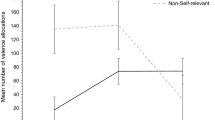Conclusions
Several conclusions can be drawn from this study: 1) At midterm there was no difference in self-concept or ideal self-concept factors clearly attributable to the videotape experience. 2) At midterm there was a significant difference on the Pleasantness factor of self-concept between videotaped males and videotaped females. 3) Females videotaped during the first half of the semester significantly increased on the Strength factor of self-concept during the second half of the semester. 4) At the end of the semester there were no significant differences in self-concept or ideal self-concept scores attributable to the time in the semester of the videotape experience. But there was a sleeper effect for females on the Strength factor that began about seven weeks after self-viewing and led to enhancement of self-concept. 5) At the end of the semester females videotaped early in the term had significantly higher scores on the Pleasantness factor of self-concept than did either group of males. 6) The significant interaction of factor x time x sex X time of videotape on the factors of ideal self-concept could not be explained.
In future studies of self-concept and ideal self-concept, as related of self-viewing, males and females should be in separate treatment groups. Further research might profitable explore the sleeper effect on the Strength factor for females, the tendency of Strength factor of self-concept scores of males and females to equalize during a speech communication course, and the possibility that the lapse of time between self-viewing and measurement may influence self-concept scores.
Similar content being viewed by others
References
Bradley, B. E. An experimental study of the effectiveness of the video-tape recorder in teaching a basic speech course.Speech Teacher, 1970,19(3), 161–167.
Brooks, W. D., & Platz, S. M. The effects of speech training upon self-concept as a communicator.Speech Teacher, 1968,17(1), 44–49.
Bush, J. D., Bittner, J. R., & Brooks, W. D. The effect of the video-tape recorder on levels of anxiety, exhibitionism, and reticence.Speech Teacher, 1972,22(2), 127–130.
Caton, C.F., & Feather, G. K. Teaching speech with television.NAEB Journal, 1965,24(6), 24–26.
Campbell, D. T., & Stanley, J. C.Experimental and quasi-experimental designs for research. Chicago: Rand McNally, 1963.
Deihl, E. R., Breen, M. P., & Larson, C. U. The effects of teacher comment and television video-tape playback on the frequency of nonfluency in beginning speech students.Speech Teacher, 1970,19(3), 185–189.
Dieker, R. J., Crane, L., & Brown, C. T.Repeated self-viewing on closed circuit television as it affects changes in students’ awareness of themselves as speakers. (HEW project No. 7-E-198, Office of Education, Bureau of Research). Kalamazoo, Mich.: 1968.
Dieker, R. J., Crane, L., & Brown, C. T. Repeated self-viewings on closed-circuit television as it affects changes in the self-concept and personality needs of student speakers.Speech Teacher, 1971,20(2), 131–142.
Ferullo, R. J. The self-concept in communication.Journal of Communication, 1963,13(2), 77–86.
Frandsen, K. D., Larson, C. E., & Knapp, M. L. Simulation and self-confrontation in interpersonal communication.Educational Broadcasting Review, 1968,2, 18–23.
Furr, H. B. Influences of a course in speech-communication on certain aspects of the self-concept of college freshmen.Speech Teacher, 1970,19(1), 26–31.
Giffin, K., & Patton, B. R.Fundamentals of interpersonal communication. New York: Harper & Row, 1971.
Goldhaber, G. M., & Kline, J. A. Effects of videotape on attendance and attitudes in the fundamentals of speech communication course.Speech Teacher, 1972,21(2), 93–98.
Hirschfeld, A. G. Videotape recordings for self-analysis in the speech classroom.Speech Teacher, 1968,17(2), 116–118.
Judd, L. R., & Smith, C. B. A study of variables influencing self-concept and ideal self-concept among students in the basic speech course.Speech Teacher, 1974,23(3), 215–221. (a)
Judd, L. R., & Smith, C. B. Discrepancy score validity in self and ideal self-concept measurement.Journal of Counseling Psychology, 1974,21(2), 156–158. (b)
Lindquist, E. F.Design and analysis of experiments in psychology and education. Boston: Houghton Mifflin, 1953.
McCroskey, J. C., & Lashbrook, W. B. The effects of various methods of employing video-taped television playback in a course in public speaking.Speech Teacher, 1970,19(3), 199–205.
Mulac, A. Effects of three feedback conditions employing videotape and audiotape on acquired speech skill.Speech Monographs, 1974,41(3), 205–214.
Nielson, G.Studies in self confrontation. Copenhagen: H. P. Hansen Bogtrykkere, 1962.
O’Connell, M. Immediate feedback, delayed feedback, and perceptual cues and inquiry during verbal interactions.Journal of Counseling Psychology, 1974,21(6), 536–538.
Roberts, C. The effects of self-confrontation, role playing, and response feedback on the level of self-esteem.Speech Teacher, 1972,21(1), 22–38.
Rosco, J. R.Fundamental research statistics for the behavioral sciences. New York: Holt, Rinehart & Winston, 1969.
Smith, C. N. The effects of self-confrontation on the self-concept. Doctoral dissertation, University of Houston, 1972. Pp. 45–48.
Author information
Authors and Affiliations
Rights and permissions
About this article
Cite this article
Judd, L.R., Smith, C.B. Changes in self-concept and ideal self-concept after viewing a videotaped speech. AVCR 25, 147–158 (1977). https://doi.org/10.1007/BF02769778
Issue Date:
DOI: https://doi.org/10.1007/BF02769778




